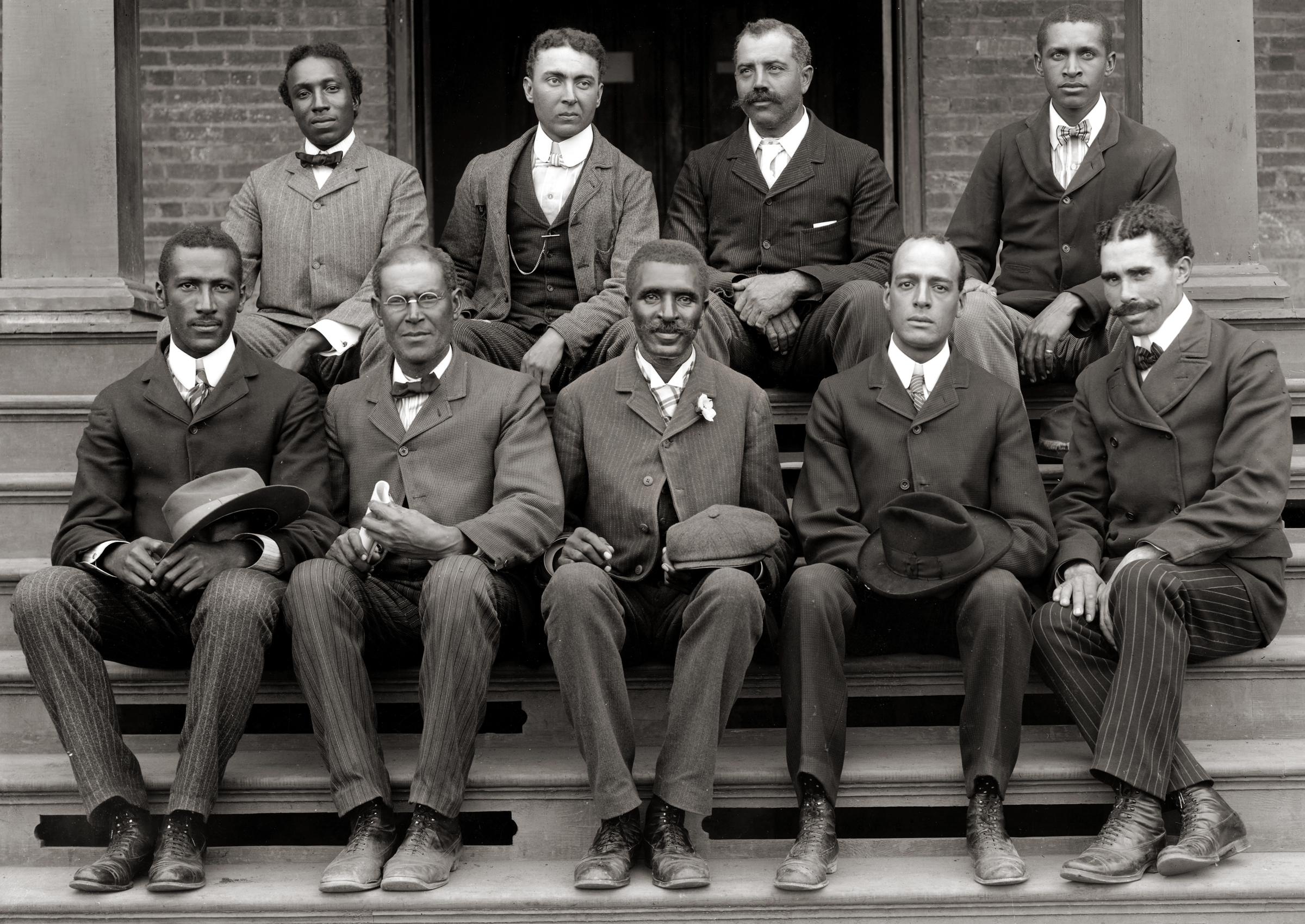George Washington Carver
Seated in the center, front row, George Washington Carver poses with his fellow faculty of Tuskegee Institute in this c. 1902 photograph taken by Frances Benjamin Johnston.
“There is no end to what I can do.”
George Washington Carver [c. 1864 – 1943] was an American agricultural scientist and the most prominent Black scientist of the early 20th century. He is a celebrated inventor, educator, artist, and musician who inspired generations to enter the sciences.
Keith Henley of the American Historical Theater will be interpreting George Washington Carver at the 2022 Victorian Chautauqua for two show times on Saturday, July 9. This will be a return visit to Mountain Lake Park for Henley, who, in 2019, portrayed Matthew Henson, the first man to reach the North Pole with US Navy engineer Robert Peary and four Inuit men, Ootah, Seeglo, Egingwah, and Ooqueah.
Better known as the “Peanut Man,” Carver was an influential inventor responsible for redeveloping the southern crop industry after the Civil War. His discoveries with plantings of peanuts, sweet potato, and soybeans changed the southern crop industry. His ideas influenced farmers not only in America but in countries abroad. Carver was a man of strong religious beliefs and great tenacity, which Henley captured in his anticipated performance.
Henley began his historic interpretation career with Historic Philadelphia, Inc. and has since worked for American Historical Theatre and History First Hand. He has performed for the Smithsonian Associates Teaching American History program, Historic Germantown, the Academy of Natural Sciences of Philadelphia, and local libraries. His dynamic presence will surely bring Carver to life on the Victorian Chautauqua stage.
As a chemistry major with a minor in mathematics and biology, Henley has a great insight into Carver’s area of expertise. Henley also studied Theatre Education at Camden County College in Blackwood, New Jersey which helps to bring his talents to the stage.
Farmers Go Nuts For Carver
While a professor at Tuskegee Institute, Carver realized soil depletion from annual plantings of the same crop could be remedied. He developed techniques to improve poor soil found on cotton farms by recommending peanuts and sweet potatoes as crop alternatives. These crops also supplied a food source for the farmers that could improve their quality of life. The most popular of his 44 practical bulletins for farmers contained 105 food recipes all using peanuts.
Carver also became a leader in promoting environmentalism. He received numerous honors for his work. Even amidst a time of high racial polarization, his fame reached beyond the black community. He was widely recognized and praised for his many achievements and talents, and in 1941, Time magazine dubbed Carver a "Black Leonardo."
A color film of Carver, shot in 1937 at the Tuskegee Institute by African American surgeon Allen Alexander, was added to the National Film Registry of the Library of Congress in 2019. The 12-minute footage includes Carver in his apartment, office, and laboratory, as well as images of him tending flowers and displaying his paintings. The National Archives digitized the film as part of its multi-year effort to preserve and make available the historically significant National Park Service film collections.
Carver applied to several colleges before being accepted at Highland University in Highland, Kansas. When he arrived, however, they refused to let him attend because of his race. In August 1886, Carver traveled by wagon with J. F. Beeler from Highland to Eden Township in Ness County, Kansas. He homesteaded a claim near Beeler, where he maintained a small conservatory of plants and flowers and a geological collection. He manually plowed 17 acres of the claim, planting rice, corn, Indian corn, garden produce, and various fruit trees, forest trees, and shrubbery. He also earned money from odd jobs in town and worked as a ranch hand.
In early 1888, Carver obtained a $300 loan for education at the Bank of Ness City. By June, he left the area. In 1890, Carver began studying art and piano at Simpson College in Indianola, Iowa. His art teacher, Etta Budd, recognized Carver's talent for painting flowers and plants so she encouraged him to study botany at Iowa State Agricultural College (now Iowa State University) in Ames.
When he began there in 1891, he was the first Black student at Iowa State. Carver's Bachelor's thesis for a degree in Agriculture was "Plants as Modified by Man", dated 1894. Iowa State University professors Joseph Budd and Louis Pammel convinced Carver to continue there for his master's degree. Carver did research at the Iowa Experiment Station under Pammel during the next two years. His work at the experiment station in plant pathology and mycology first gained him national recognition and respect as a botanist. Carver received his Master of Science degree in 1896. Carver taught as the first Black faculty member at Iowa State.
Doctor By Reputation
Despite occasionally being addressed as "doctor," Carver never received an official doctorate. He noted that it was a common misnomer due to his abilities and assumptions about his education. Both Simpson College and Selma University deservingly awarded Carver honorary doctorates of science in his lifetime. Iowa State later awarded him a doctorate of humane letters posthumously in 1994.





